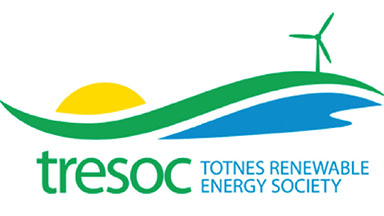Totnes Renewable Energy Society (TRESOC) has secured a second Rural Community Energy Fund (RCEF) grant of £18,000 to look at the feasibility of developing a 100kW anaerobic digester (energy plant) at Old Parsonage Farm on the Dartington Hall Trust (DHT) estate.
The plant would process farmyard manures with other green materials and, potentially, food wastes from cafés and restaurants on the estate. These feedstocks would be processed by anaerobic bacteria in an on-farm digestion tank to produce methane gas, which would be used to generate electricity and heat. The spent digestate, with valuable plant nutrients, could be used as a clean organic fertiliser on the farm.
Roger Papworth, RCEF Programme Manager, commented: “The Rural Community Energy Fund was pleased to award a Grant to Totnes Renewable Energy Society as this is a great example of a community group investigating renewable energy options that the fund aims to support. We look forward to hearing of a positive outcome once this work has been completed.”
Jo Talling, the Dartington Hall Trust’s property director, said: “We welcome this research into whether an anaerobic digester would work on the estate, as there are currently large quantities of farmyard and food waste produced here that are unharvested. We would be very keen to add to the existing renewable systems we’ve been installing on the estate since 2016: the two biomass boilers heating The Green Table café, listed Dartington Hall courtyard buildings, the Granary and Space studios, as well as a solar array. We look forward to hearing the news.”
The feasibility work will be carried out in partnership with tenant farmer Jon Perkin at Old Parsonage Farm on the Dartington Hall estate, and Dr Phil Hobbs of Anaerobic Analytics, a leading international expert in biogas research specialising in optimising bioenergy productivity. Careful monitoring of the energy demand of Parsonage Farm and the wider Dartington Hall estate will be completed with Totnes-based Argand Solutions.
In the event that the study proves that a digester would be commercially viable, TRESOC would seek to raise finance for construction through a community share offer, ensuring that the plant is owned by the local community. This ensures that the economic benefits from the projects are shared locally too.
The RCEF grant will also be used for engaging with the local community, with the extension of TRESOC’s successful Renewable Energy Experiential Learning (REEL) programme to include two more local schools. The local community will be invited to several meetings to discuss the project, which are planned to take place early next year. Interested parties will be invited to take part in a ‘walk & talk’ session, to visit the site and to ask questions about the project in an informal setting.
TRESOC’s Renewable Energy Experiential Learning (REEL) Project, co-delivered by the Bio-regional Learning Centre, is a 4-day module for Key Stage 2 students within the Totnes area. It includes practical, hands-on making, site visits, critical thinking ideation and presentation of learnings. TRESOC ran the pilot project at St Christopher’s Prep School Staverton in June this year. Thanks to a donation from an anonymous TRESOC supporter, the organisationwere able to make a short film during the pilot to show potential sponsors and schools what the project is all about.
LISTEN: Jon Perkins of Old Parsonage Farm talks to BBC Radio Devon about the new scheme

